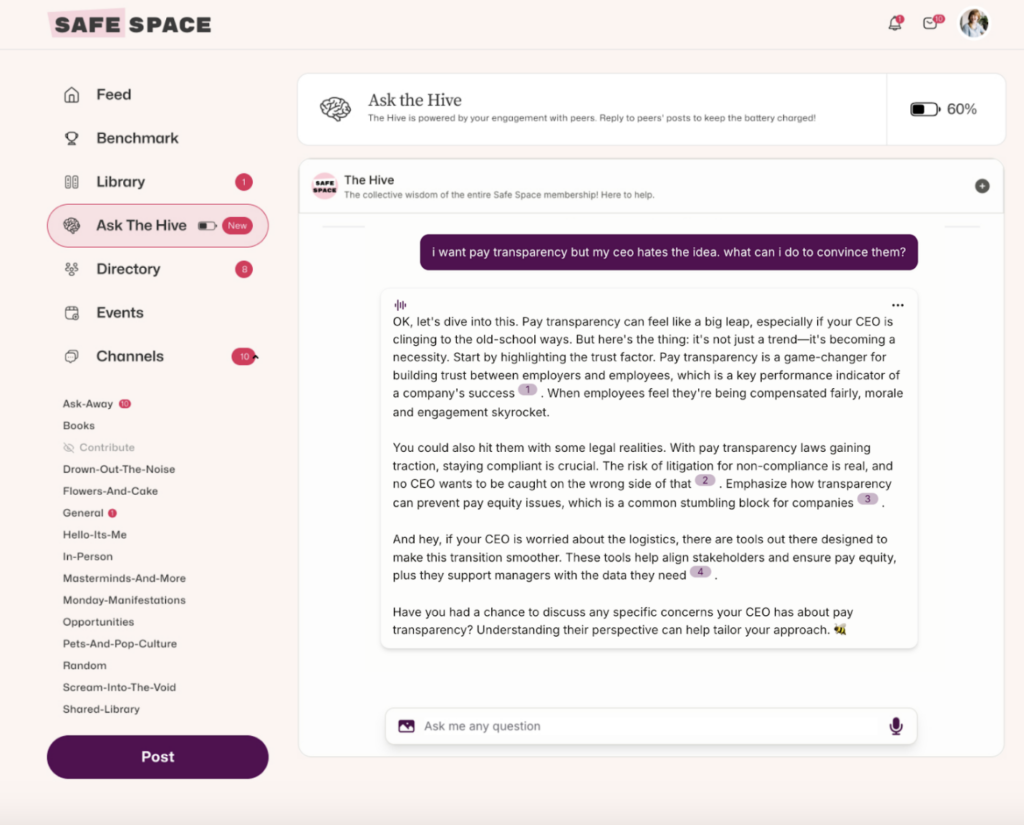
✍🏽 My company emphasizes work-life balance but I am finding more and more that only people with families or partners are benefiting and us single and Gen Z-aged employees are getting the short end of the stick. Do you have any suggestions on how we can make work-life balance feel more equitable for single, younger employees?
Context: I am a Gen Z HR generalist, and my fellow Gen Z employees have been communicating their frustrations about their teams because many of their coworkers are either pregnant, have children, or are getting married. Because of all of this, they have been expected to take on meetings outside of work hours and cover for their coworkers so they can pick up their kids at school every day, etc. Private equity-owned software tech company, about 300 people across 10 countries (primarily in the US).
📣 Rebecca Dobrzynski, Senior HR Business Partner @ Klaviyo:
I’m going to specifically caveat that I’m speaking only from US office culture for this one, though I’ve worked in several different industries and would have the same advice in each:
The best thing any of us can do about this issue is to normalize not over-sharing information about boundaries and availability at work. Encourage your peers and all employees to be more general about the reasons for their (lack of) availability, by leaning more on language asserting that they are utilizing an available benefit (like sick time) or by cutting out unnecessarily details from their explanations. If you’re in a position to influence senior leaders to lead by example here, you’ll be even more effective. But even if you can get a respected middle manager on board with being a champion of this behavior, you should see some differences.
Examples:
- “I can’t stay late, I have to pick up my kids from daycare and my spouse can’t do it because they are sick” becomes “I have to leave at my normal end time. I have personal obligations that can’t be moved.”
- “I don’t want to stay late to cover for Coworker Who Is a Parent, I want to go to dinner with my friends after my work day is over” also becomes “I have to leave at my normal end time. I have personal obligations that can’t be moved.”
- “I have to take today off, my child has a fever and was vomiting all night so can’t go to school and my spouse is on a business trip” becomes “I’m taking a sick day today, and I’ll let you know by 9am tomorrow if I need to be out for longer.”
- “I have a migraine and can’t sit up straight let alone think about working today” also becomes “I’m taking a sick day today, but I’ll let you know by 9am tomorrow if I need to be out for longer.”
Train your leaders to reject overly personal details. Have them say: “Thanks for letting me know how you’re thinking about managing your time. I actually don’t need to know all your personal details, just that you’re planning to take vacation/sick/personal/flex time or that you can’t attend that outside-of-working-hours event, plus any coverage that is planned/needed. PTO is a benefit that everyone is entitled to, and I want you to take it, and part of my job is to balance evening/weekend coverage in a way that makes sense for everyone.”
Your single, younger, and/or “more flexible” employees should do the same thing.
- If asked to stay late to cover for a coworker with childcare responsibilities: “I’m sorry, I can’t do that today. I have personal plans that I can’t change.”
- If trying to plan paid time off and worrying that a coworker’s time will be prioritized because of school vacations, family-oriented holidays, etc: “I’m trying to get ahead with planning my annual PTO. I’m looking at XYZ dates, and here’s the critical work that will need to be covered.” (Now’s not the time to say you’re going to Cancun with your college roommates, just that you’re planning to be away from work to utilize your vacation benefit, and *of course* you’re being responsible and planning ahead.)
In the vast majority of situations, managers don’t actually need to know details about the reasons behind PTO/availability. And if they are running into issues where too many people are requesting the same time off or no one is available for critical evening/weekend work, they need to look for ways to incentivize employees to raise their hands to work at those times. Not pit employees against each other by judging whose personal time is more or less valuable or flexible.
The last thing I’ll say is that, even though I 100% agree that certain employees should not be *expected* to be more flexible, it can be beneficial to make yourself available for those extra responsibilities *some of the time.* If you do have the ability to cover for another coworker occasionally *without it being a hardship for you,* that can build trust and good will, get you facetime with leaders or influential coworkers you might otherwise not interact with, give you an opportunity to own a project with big impact, etc. But if you aren’t seeing that benefit… then yeah, stop picking up more work and getting nothing in return.
While some managers/employers do explicitly believe that employees without spouses/children should pick up more work, it’s more common in my experiences that leaders simply keep making requests/shuffling responsibilities until they hit resistance. So if you keep staying late/taking on after-hours responsibilities/agreeing to cover for coworkers, your manager might genuinely – and legitimately! – believe that it’s not a problem for you because you never indicated that it was. Your coworkers with families are asserting boundaries, and you can too. Give it a try and see what happens… Just don’t feel compelled to give a ton of detail about why you have the boundaries that you do.
📣 Sondra Norris, OD/OE Consulting:
I remember a past-child-bearing-years employee complaining while a bunch of younger employees became parents all around the same time and were taking their FMLA and company-policy leaves, “Why don’t I get that vacation? Just because I don’t have kids I don’t get that time off?”
Not the same, I know, but this question brought that situation to mind.
I also remember that I was required to travel for my job and was approached by my VP of HR to be told about the complaints he was fielding from people who didn’t travel. “She’s never at work, why is she getting special treatment?” His request was that when I was in town to make sure I stayed at my desk.
Here’s the thing – company performance is a team sport.
JOIN 150K+ HR LEADERS
Get insights, learnings, and advice on how to build companies and cultures that people actually love.
No spam. Unsubscribe any time.
It’s like traffic flowing on the freeway – you have to work together for it to flow. Let people in when they need to change lanes so they don’t have to stop in their lane. Don’t go slower than the flow of traffic in the fast lane. Sometimes even when I need or want to drive faster (let me be responsible for my own performance) I have to forego my needs.
The unlimited PTO policy one of my start-ups had was very specific. PTO is unlimited under the following conditions:
- Your team knows what’s up, when you’re going to be gone, workload isn’t being disproportionately put on other team members.
- Your job is getting done.
- There was also a limiter about the max number of consecutive workdays off and also too many Friday/Monday combinations that would allow people 4-day weekends. (Someone took 8 consecutive weeks of PTO which prompted the max days limiter.)
Here’s the other thing – these generous and flexible policies require intention and discipline and coordination to work, relying on the employees’ ability to communicate about it and manage it. It’s a compliment to the employees that the company believes the employees and managers are capable of doing that.
But I haven’t seen one situation that eventually doesn’t devolve into employees needing the company to step in and enforce the policy, usually having to change it back to a more severe and traditional policy – the employees aren’t able to navigate the situation for themselves. And it usually starts with things that sound just like this: It’s feeling unfair and we don’t know what to do about that.
It is fair for the job to have requirements, including time-you-must-be-available requirements. Those must be defined. If I’m understanding the post correctly, people are having to slide over into specific time slots to be available and cover for the folks who aren’t there at that usual time of day (kid pick-up time).
Ideally, that job has a requirement that says the person in the job has to be there and available during certain hours. This then becomes not an issue of fair/unfair use of PTO, but it becomes a performance issue.
It is also fair for the manager to “work the whiteboard” (a la Modern Family) – or have the team responsible for working the whiteboard, to ensure that tasks, projects and assignments are not disproportionately getting loaded onto some team members.
To me, this is much less a PTO policy administration issue and more a general performance management issue:
- Are clear performance standards defined for the roles?
- Are employees and managers being accountable to those standards?
- Are there clear limiters and expectations on how to be work-life balance friendly AT THIS COMPANY WITH THESE PERFORMANCE REQUIREMENTS? Have these been clearly communicated to the employees?
- Are the managers and teams capable of managing this basically administrative task?
SIDE NOTE: Some roles at some times are able to enjoy more flexibility than other roles – that’s just a fact. Some people are able to get their jobs done more efficiently than others are for a whole host of reasons – seniority and experience; how much time they spend talking and socializing vs. getting the job done – also just a fact. (For example, pre-COVID, we had a whole group of people who liked to play ping pong and socialize during the day complain that others were able to take more PTO – yes, they were, because they were more efficient at getting their jobs done).
The employees are looking for the company to step in and take action, to make a decision. The environment around PTO has become uncertain and unpredictable – the rules aren’t clear. Adjust and clarify.
Also look at what else might be contributing to how it’s become confusing, unclear, uncertain for the employees – this might be just the thing “the patient is presenting with” … there are likely other things beneath the surface, but this feels like it could be something the employees are bringing up to test and see if the company will take action as a general indicator of trustworthiness.
📣 Tammi Burnett, Director of People and Culture at Rainforest Action Network:
As with many, many (most?) issues in the workplace, this is a leadership and management issue. Managers have a duty to ensure fairness and flexibility for their teams. That means they need to be checking in with folks to see how things are going, and if something isn’t working, they should be trying to remedy it.
This requires open communication and empathy, to ensure team members feel comfortable voicing concerns. Managers should also know their direct reports schedules, and take note of any patterns where some folks are constantly covering for others. Ultimately, team function is not an individual issue; it’s the core function of management.

✍🏽 How do you ask a higher-level employee to consider retirement?
Context: Mid-size Law firm. Employee in question is a Partner.
📣 Sondra Norris, OD/OE Consulting:
This is a bit of a tricky question without any context. Is there a performance problem? Does the company need to control costs? Has the company changed and this person hasn’t changed with it?
You can’t go to the person without having the narrative in place. As humans, I’d hope that the conversation could be as real as possible – for the partner’s sake and for the sake of all the people watching how the situation gets handled.
EXAMPLE:
An organization pushed an Early Retirement Option scheme to employees over a certain age and at a certain tenure. From behind the scenes, leadership felt that the company needed “new blood” to succeed in its new strategic ambitions that they felt would require innovation and creative thinking, which clearly, “old people” are all out of. The company also felt like they could pay younger, less-tenured people (also less experienced, less business savvy, no institutional knowledge, no long customer relationships) less money to “do the same job.”
What all the employees knew was that these over-a-certain-age employees were the exact people responsible for some brilliant pioneering and innovation that birthed the company in the first place. They were the original keepers of the soul of the company.
Also, what all the employees culturally believed is that elders should be respected and taken care of.
It also got out, because it always does, what the company was offering to those who opted for the Early Retirement Option – and it was actually shameful. The employees rebelled – “After giving so much of their lives to this company, after being the people upon whose backs this company was built… they should be much more well taken care of. This company doesn’t believe in what it says: people come first. PFFFFFT.”
And this program became one in a long line of things that eroded the employees’ trust in the company and its leadership.
(The good news is that the company’s leadership listened to its employees and revamped the whole thing, including people in the future who would reach retirement age and how they would be rewarded.)
So, how do you approach one person that you, for some reason, feel should retire?
Very carefully.


